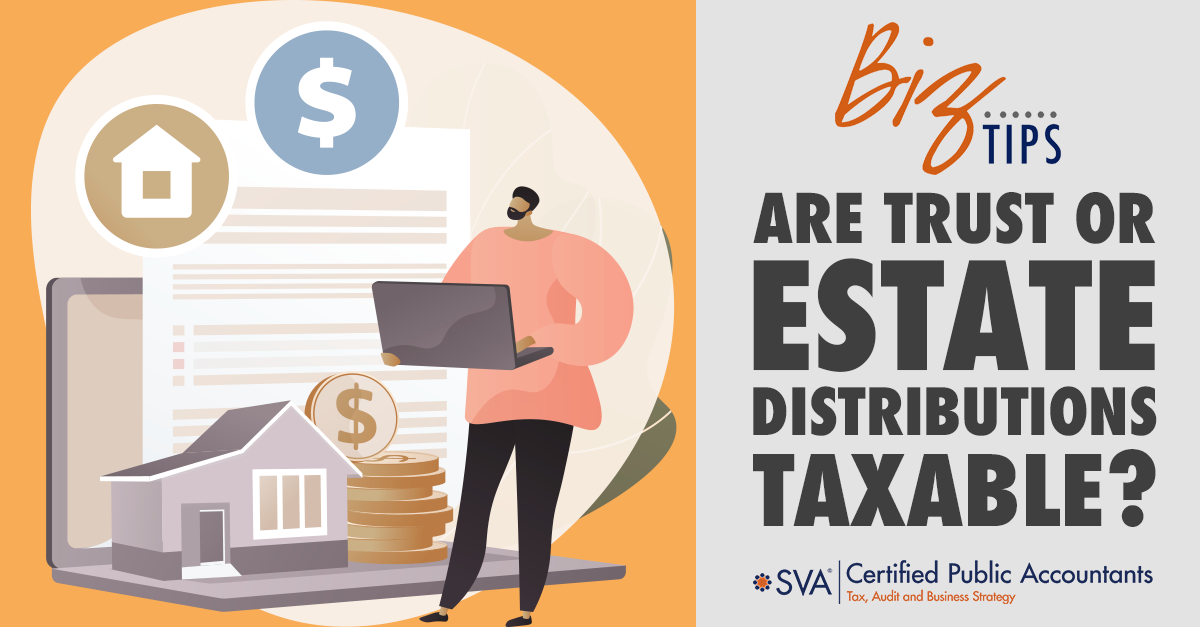| Highlights: |
- Explains how trust and estate distributions are taxed differently depending on whether they come from principal or income.
- Clarifies that principal distributions generally aren’t taxable income for beneficiaries and aren’t reported on individual tax returns.
- Shows income distributions require the trust or estate to issue a Schedule K-1, and beneficiaries must include that income on their tax return.
- Notes tax rates for trusts and estates mirror individual rates but with narrower brackets, often resulting in higher marginal rates.
|
One of the most common questions in trust and estate administration is whether distributions are taxable. The short answer is: it depends on the type of distribution.
Understand the breakdown of the tax treatment of trust and estate distributions, explaining the key differences between principal and income distributions.
Comprehending these distinctions can help beneficiaries and fiduciaries navigate tax reporting and plan more effectively for their financial obligations.
(Download Video Transcript)
Principal Distributions
Generally, the principal of a trust or estate is the amount of assets that funded it plus any prior year income previously undistributed.
Since many trusts are created to safeguard assets, they often have strict rules regarding when principal distributions can be made, as decreasing trust principal also reduces the trust’s ability to earn income. It is essential to consult the trust document and your tax advisor to determine if principal distributions are desirable or even allowed in your specific circumstance.
For estates, distributions are assumed to come from principal instead of income if they are specific bequests. Specific bequests are any specific assets given to an individual via inheritance. The asset must be unmistakable, and the intended recipient must also be without question. For example, John leaves $10,000 to his daughter Susan.
Principal distributions are not considered taxable income and beneficiaries will not need to report them on their individual tax returns.
Income Distributions
Trust distributions are typically considered to be from current-year income first, then from any accumulated principal if the amount distributed exceeds income for the year. This is also true for estate distributions for the residuary beneficiary of the estate. The residuary beneficiary is the person who receives property by inheritance that is not specifically left to another designated beneficiary.
Like individuals, estates and trusts are required to file a fiduciary income tax return each year income exceeds the annual exemption amount. When these entities make income distributions, they are able to deduct them from the entity income.
The beneficiary of those distributions then receives a Form K-1 from the entity reporting the amount and type of income that was distributed to them, which the individual then needs to include on their tax return.
This “system” ensures that income is either taxed on the entity’s tax return or on the beneficiary’s tax return, but not on both. In many cases, there are benefits to having the income taxed to the beneficiary instead of to the estate or trust.
The tax rates for these entities are the same as for individuals, but the brackets are much narrower, so their marginal tax rates are usually higher. For example, a trust or estate reaches the highest tax bracket of 37% at only $13,450 of taxable income.
(Download Video Transcript)
How Can I Know What Type of Distribution I Received?
Whether the distributions you received are considered principal or income (and how to report properly) depends greatly on your specific circumstances. Contact your SVA advisor to discuss your specific situation.
© 2022 SVA Certified Public Accountants

